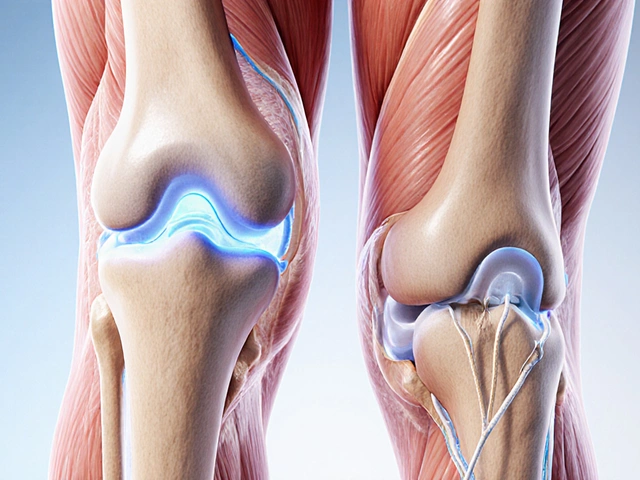- Home
- Orthopedics
- Who Is Not a Good Candidate for Total Knee Replacement? The Key Factors You Need to Know

Who Is Not a Good Candidate for Total Knee Replacement? The Key Factors You Need to Know
Total knee replacement can sound like the golden ticket for anyone stuck dealing with daily knee pain. You might be surprised, though—this surgery isn’t for everybody. Not all knees (or lifestyles) can handle the fix, and sometimes the risks far outweigh the rewards.
If you’ve ever wondered why some folks get told a firm 'no' after thinking they’d be a shoe-in for this surgery, you’re in good company. Understanding why doctors hit the brakes on knee replacement isn’t just a technical checklist—it could actually help you plan your next move for keeping active and pain-free. Let’s get into who usually lands on the 'not a candidate' list and what you can do if you’re one of them.
- Common Medical Reasons for Ineligibility
- Age and Weight Considerations
- Lifestyle and Activity Level Factors
- Alternatives and Next Steps
Common Medical Reasons for Ineligibility
Not everyone with knee pain will benefit from total knee replacement—in fact, there are some clear medical reasons you might get a straight-up no from your orthopedic surgeon. A lot of it boils down to safety. This surgery is a big deal, and if you have certain health issues, taking the risk just doesn’t add up.
One major red flag is serious infection, especially when it’s active or not fully cleared up. Operating on a knee with a lingering infection can lead to disaster. Uncontrolled diabetes and immune system diseases also land you in the unsafe zone, since your body won’t heal well afterwards. Think of it like upgrading an engine while the car’s on fire—it just doesn’t work.
| Condition | Why It’s a Problem |
|---|---|
| Active Infection (anywhere in the body) | High risk of severe joint infection post-surgery |
| Poorly Controlled Diabetes | Slows healing and ups infection risk |
| Severe Vascular Disease | Poor blood supply means the new joint might never recover |
| Neuro-muscular Disorders | Leads to joint instability and weak recovery |
| Morbid Obesity (BMI > 40) | Implants fail faster, risk of complications skyrocket |
Severe vascular or blood flow problems are another no-go. The body can’t patch up new wounds if garbage circulation is holding things up. These people often take much longer to heal and face higher risks of losing the new joint altogether.
Serious nerve or muscle problems? Another big reason docs might hit pause. Weak muscles or nerve damage make it hard to support a new knee structure, sending the fresh hardware down a bumpy road.
Here’s a truth bomb from the experts over at Johns Hopkins Medicine:
“Patients with poorly controlled chronic diseases such as diabetes, severe heart or lung problems, or ongoing infections are at greatly increased risk for complications following total knee replacement.”
Some medications, like heavy-duty blood thinners, can mess with surgery and healing, too. If you’re stuck on certain meds long-term, the timing might just not be right—or there might be safer ways to handle your knee pain.
If you see yourself in any of these groups, it doesn’t mean you’re out of luck forever. Sometimes getting a health condition under control can put knee surgery back on the table later. Always run your full health history past your surgeon, and don’t be shy about asking follow-up questions.
Age and Weight Considerations
Age and weight are two huge players when it comes to deciding who gets the green light for total knee replacement. Sometimes it’s less about the pain you’re in and more about the risks you face once you hit the operating room and recovery.
Let’s start with age. It’s not that there’s a strict age limit—there isn’t. But if you’re under 50, most surgeons will want to try everything else first. Knee replacements just don’t last forever (we’re talking 15 to 20 years if you’re lucky), and nobody wants you back for a redo at 60. On the flip side, age itself isn’t a dealbreaker; it’s more about your health and whether you can bounce back from surgery. If you’re in your late 80s and struggle with other health issues like fragile bones or heart problems, doctors get cautious.
Quote to remember:
"You shouldn’t see knee replacement as an age-based decision. It’s about your health and quality of life, not just your birthdate." – Dr. Michael Mont, Orthopedic Surgeon, Cleveland Clinic
Now flip to weight. Higher body weight is tied to more wear and tear on your new knee, higher risk during surgery, and a tougher recovery. If your BMI is above 40, many doctors may put surgery on pause until you lose some pounds. Carrying extra weight bumps up the chance for complications like infection or poor wound healing.
| BMI Range | Risk Level for Knee Surgery |
|---|---|
| Below 30 | Standard risk |
| 30-40 | Moderate risk (closer review needed) |
| Above 40 | High risk (often surgery delayed) |
If either your age or your weight kicks you over into the 'higher risk' group, doctors may recommend:
- A stronger focus on physical therapy or injections first
- Guided weight loss plans
- Delaying surgery until other medical issues are better controlled
The point isn’t to shame or scare—it’s about making sure a knee replacement actually improves your life, not just swaps one set of problems for another.

Lifestyle and Activity Level Factors
Your daily habits and how you use your knees are a big deal when it comes to being a candidate for total knee replacement. Surgeons look closely at lifestyle stuff, not just X-rays. If you’re dealing with chronic knee pain but expect to go straight back to high-impact sports or extreme workloads after surgery, you might need a reality check. Artificial knees are strong, but they’re not built for things like daily basketball, running marathons, or jobs that involve tons of heavy lifting and squatting.
People who work in construction, farming, or any job where you’re always on your feet, kneeling, or climbing, need to talk honestly with their doctor. These routines put way more stress on the new joint, which increases the chance of implant failure or faster wear-and-tear. If you keep hammering away at it (literally or figuratively), you could be looking at a second surgery sooner than you think.
Let’s talk activity extremes. Surprisingly, not being active at all can also be a problem. If you’re rarely moving, with weak muscles and limited flexibility, your recovery could take longer or your new knee could stiffen up. The catch: doctors want to see that you have the motivation and ability to stick to rehab, walk, and work on strength. This isn’t just about being able to exercise—it’s about making your knee surgery actually work in the long run.
- If you can't promise to follow a rehab program after surgery, that’s a red flag for your surgeon.
- If you expect to jump back into high-level sports, you'll need to adjust those expectations, or consider different treatments.
- If your hobbies include kneeling for gardening or doing floor work, ask about special recommendations—knee replacements don’t love that position.
If you’re a smoker or drink heavily, that matters, too. People who smoke heal slower and have higher odds of infection after knee replacement. Docs usually want you to quit smoking weeks before surgery and (ideally) keep it that way.
Here’s a snapshot of activity guidance from recent knee implant research:
| Activity | OK After Knee Replacement? | Notes |
|---|---|---|
| Walking | Yes | Encouraged for rehab and cardio health |
| Swimming | Yes | Low-impact, good for joints |
| Running/Jogging | No | High impact, risks early implant failure |
| Heavy Lifting/Manual Work | Caution | May shorten implant lifespan |
| Competitive Sports (Basketball, Soccer) | No | Not recommended due to joint stress |
So before jumping into knee replacement, get real about your daily routines and future plans. It’s not just about getting rid of pain—your lifestyle actually matters just as much for a good outcome.
Alternatives and Next Steps
If you find out that total knee replacement isn’t for you, don’t stress. There are concrete steps you can take to tackle knee pain, and not all roads lead to surgery. In fact, tons of people manage just fine with different approaches; sometimes, it’s about mixing a few of these options for the best results.
Let’s look at what else is on the table if surgery is off-limits:
- Physical therapy: This isn’t just basic stretching. Skilled therapists design programs to improve your knee strength, flexibility, and balance. Even just two sessions a week can make walking and stairs less painful.
- Weight management: Dropping just 10 pounds can take up to 40 pounds of pressure off each knee with every step. For folks over a healthy weight, this change alone can ease pain big time.
- Pain medication: Over-the-counter drugs—think acetaminophen or ibuprofen—work for mild pain, but talk to your doctor before using them daily. Sometimes your doctor might recommend stronger prescriptions for the short term.
- Injections: Corticosteroid shots are a popular pick when pain gets stubborn. They give temporary relief for months at a time. Sometimes, doctors use hyaluronic acid shots, which are a bit like adding lube to a squeaky hinge.
- Braces and supports: Knee braces stabilize the joint and reduce pain during everyday activity—especially when working or staying active is a must.
- Alternative treatments: Acupuncture, supplements like glucosamine, and even platelet-rich plasma (PRP) injections have shown mixed results, but some folks swear by them. Just double-check with your doctor before diving in.
For many, mixing a few of these strategies gives the best shot at avoiding knee replacement surgery. If these aren’t cutting it, don’t throw in the towel. There might be options like partial knee replacement, which is less invasive and can buy time before a bigger operation is needed. Or, your doctor might suggest minimally invasive surgeries to clean up the joint (arthroscopy) or even procedures that shift weight stress away from the damaged part of your knee (osteotomy).
Wondering how people feel about these alternatives? Here’s a look at how long typical relief lasts:
| Treatment | Average Relief Duration |
|---|---|
| Physical therapy | Ongoing, as long as maintained |
| Corticosteroid injection | 2-6 months |
| Hyaluronic acid injection | 4-6 months |
| Bracing | Ongoing, with use |
The real key is teaming up with your doctor and being open about your goals. Whether you want to keep up with grandkids, work on your feet, or just walk pain-free, there’s usually a plan that can help—even without total knee replacement.

Arnav Singh
I am a health expert with a focus on medicine-related topics in India. My work involves researching and writing articles that aim to inform and educate readers about health and wellness practices. I enjoy exploring the intersections of traditional and modern medicine and how they impact healthcare in the Indian context. Writing for various health magazines and platforms allows me to share my insights with a wider audience.
About
Medical Resource Center India is a comprehensive online platform dedicated to providing reliable health information and medical resources in India. Explore a wide range of articles, tips, and advice on medicine, healthcare services, and wellness. Stay informed about the latest developments in Indian medicine and access valuable insights into maintaining a healthy lifestyle. Discover expert guidance and health solutions tailored for every Indian citizen. Your go-to destination for authoritative medical knowledge in India.






